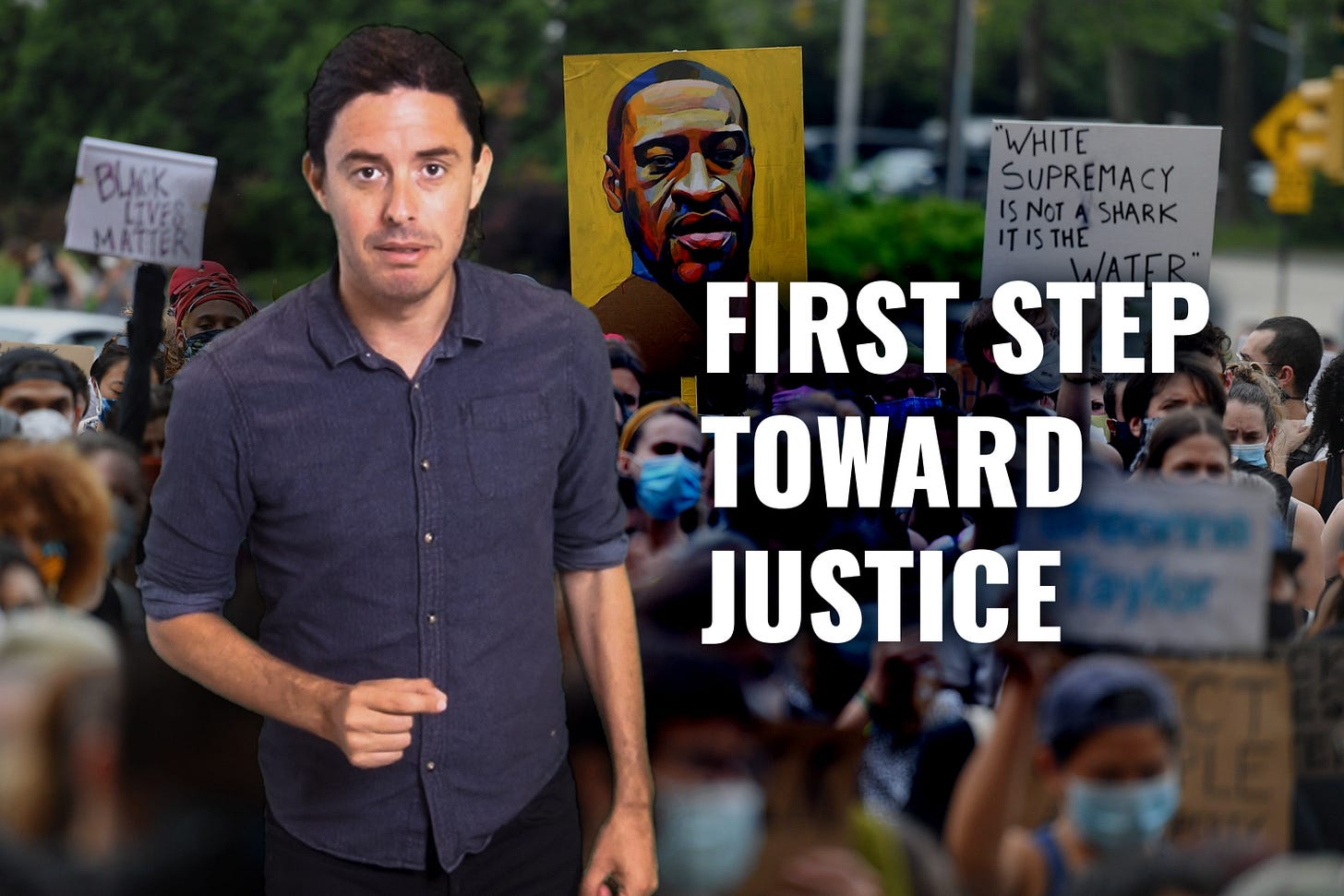Not My Party: First Steps Toward Justice
Police violence, the culture, and opportunities for progress.
Last summer, millions of Americans took to the streets and spoke out against police violence. It felt like the exciting beginning of progress toward racial justice. But that rush of hope quickly devolved into yet another battle in our unending culture wars.
Black Lives Matter v. the Thin Blue Line. We've had to watch the horrific videos of Adam Toledo and Daunte Wright gunned down by police. It's easy to understand why people feel despondent. In the U.S. in 2019, police killed 1,146 people—3.5 out of every million—disproportionately black men. In Britain, police only killed three people that year. In Japan, two. In Hong Kong, one. In Denmark, zero. And there's no doubt that it's our deeply rotten system and culture that creates that kind of disparity.
But, today I want to paint a picture of something hopeful. What if the guilty verdict for Derek Chauvin is the first step toward justice? What if the protests surrounding George Floyd's death do lead to lasting change? Consider this: When I was a Catholic school boy, the only people who supported pot legalization and gay marriage were far-left liberals, kooky libertarians . . . and Andrew Sullivan. Now ripping the bong at gay weddings has basically unanimous support. Why can't we see progress like that in policing?
Well, we're set back by our toxic culture wars. There's the calls to riot or abolish the police on the far left, and then there's the disgusting demonization of black victims on the right. These fights mask that underneath it all, there is a lot of potential agreement.
Polls show that two thirds of the country support major change and recognize racial bias in policing.
Here's one obvious place to start: Unions. Democrats really don't like police unions.
"They continuously allow themselves to overextend the power that they should be having."
And Republicans really don't like unions, period.
"If you try to make a union, I'll crush you." [Dave Portnoy, Barstool Sports.]
Seems like there could be some synergies here we could work with.
Ideally we can eliminate police unions altogether.
"What world are we living in? That doesn't happen!" [Mike O'Meara, president of the New York State Association of Police Benevolent Organizations.]
Or at least reform them so stop protecting bad cops.
The expansion of body cameras is broadly popular and has been huge in exposing police misconduct and spurring change. Look, more cameras, more justice. Plus, if those "Don't Tread on Me" flags are for everyone and not just the whites, then more can get on board with libertarianish conservatives like Rand Paul who sponsored the Justice for Breonna Taylor Act that bans no-knock warrants.
Here's another reform that both sides could get behind: Deescalation training. Cops here are too quick to fire their weapons, partly because we have an inadequate training system that varies from city to city, state to state. After Police Academy, the average officer in America receives less than four hours of hands-on defensive tactics training.
There are a bunch of policies that could help deescalate situations, but one creative idea that cops actually like is Brazilian jiu-jitsu training. A police department in Marietta, Georgia, piloted a mandatory jiu-jitsu training for its rookies. It resulted in dramatic decreases in suspect injuries, officer injuries, taser deployment, and firearm usage.
Now I don't necessarily want my kid to be on the receiving end to police jiu-jitsu. But it does seem better than the alternative.
The point is that there are tangible ways to make things better. Look, the legacy of systemic police abuse targeting black and brown Americans is not gonna unravel overnight. Racist cops aren't just gonna disappear like that. Neither is the reality the police are more trigger happy in America, partially because of widespread gun ownership and a culture that kinkifies these deadly hand penises. But young people marching in the streets and Black Lives Matter advocacy groups shining light on the problem are making a difference. People are being won over to the cause. There's more momentum for political action than it might seem. We can move forward and do right by George Floyd, Adam Toledo, Daunte Wright, Breonna Taylor, and the countless others who've been lost to our broken system.



